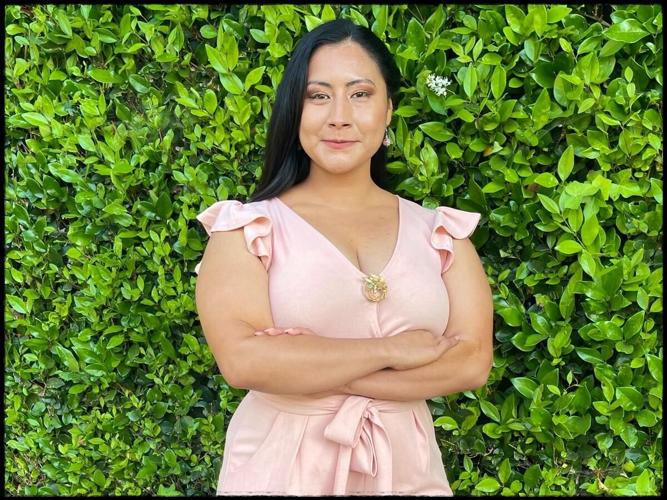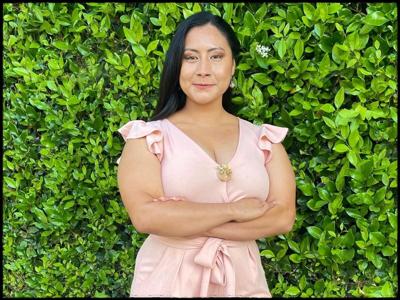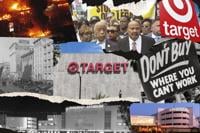As a young girl, when she was only five-years-old, Ingrid Rivera-Guzman migrated to South Central Los Angeles with her mother and siblings to escape the 12-year war that was occurring in El Salvador. Years later, with hard work and dedication, Guzman received a scholarship to attend the College of the Holy Cross located in Massachusetts, where her interest in politics began.
Attending a private liberal arts and Jesuit institution, she was surrounded by principles that were based on social justice and equity. After Guzman received her bachelor’s degree in 2013, majoring in political science, she quickly began implementing what she had learned in college to become an advocate for her community. For her, college was the place where her critical consciousness grew. There, she was fully able to understand that the injustices her community faced had a reason and were based in inequity.
“I really started to learn more about how public policies impact the way that your community is and the opportunities you have, and a lot of the social injustices that I was learning about while in college were happening to my neighbors here in South Central,” Guzman said.
In 2019, Guzman furthered her education by receiving a master’s degree in public policy from Mills College at Northeastern University in Oakland, CA. There, she gained more knowledge surrounding social justice and understanding what it means to have access and how to use your privilege. After receiving her master’s, Guzman moved back to South Central, and in 2020 she decided that she would run as a write-in candidate for District 8 of the LA City Council. District 8 encompasses theneighborhoods of Baldwin Hills, Chesterfield Square, Crenshaw, Jefferson Park, and other communities of western South LA.
Despite not winning the election, Guzman came across the Latino Coalition of Los Angeles (LCLA), a nonprofit organization whose mission is “to empower BIPOC (Black, Indigenous, people of color) communities with resources and knowledge to achieve equity and justice through community engagement, coalition building, and policy advocacy,” as stated on their website. The organization’s headquarters is located in the greater LA area.
Compared to other organizations, LCLA, founded in 2009, stands out as a social welfare organization, meaning it can get involved in political efforts and political advocacy. Guzman shared an example of this, which was how the organization took part in the midterm elections this year by having candidate endorsements. LCLA also provided voters guidance for propositions and measures in English and Spanish through their Instragam and Facebook accounts.
As Guzman discovered the organization, she was interested in specific issues they were focusing on, such as the digital divide among marginalized groups, which includes Latinos. Guzman said this was the first time she heard about the digital divide through a panel discussion held virtually in 2020 and it drove her to get involved with the LCLA to provide the appropriate technology to a school in LA.
“I primarily got involved with the coalition through the youth development committee because they were working on an effort to get iPads to some students in a charter school in Highland Park called Academia Avance,” Guzman said. “They’re 90% Hispanic/Latino students, in an underserved community, so we were trying to figure out a way to get them iPads so they could continue with their learning.”
Eventually, Guzman became the president of the board of directors for LCLA and continues to help communities thrive in LA.
Along with Guzman and the LCLA, many organizations focus on helping marginalized communities by advocating and providing knowledge to help them get a better understanding of politics so they can take part in it.
In connection to the LA City Hall scandal, where racist remarks in conversations between city council members were leaked, including former LA City Council President Nury Martinez, Councilmembers Gil Cedillo and Kevin de León, and former LA County Federation of Labor President Ron Herrera. Responding to the recent scandal, people like Gomez are encouraging communities to get politically involved so they vote for the right leaders to represent them. Guzman pointed out how important it is for people to now get more involved in politics and not be discouraged.
“People are very apathetic towards politics. We’ve lost faith and we feel like it’s corrupt, and the system is bad and there’s nothing we can do about it,” Guzman said. “But I think that the biggest threat is when we start to disengage and we allow it to continue to be that way.”
Recently, the LCLA celebrated its 13th anniversary at the Airliner in LA on November 14. If you want more information on the organization, you can visit their website.
CALÓ NEWS interviewed Ingrid Rivera-Guzman to have a discussion revolving around the topic of Latinos and other groups being harmed by the LA City Hall scandal and additional information about the LCLA. Guzman also shared the achievements and work the organization has been involved with.
Responses have been edited for clarity and brevity.

Ingrid Rivera-Guzman
INGRID RIVERA-GUZMAN, 31, SOUTH CENTRAL, LOS ANGELES, PRESIDENT OF THE BOARD OF DIRECTORS FOR THE LATINO COALITION OF LOS ANGELES, SHE/HER/ELLA, LATINX/LATINA/HISPANA/SALVADOREÑA
WHAT NEEDS TO BE DONE TO HEAL THE WOUNDS AND HOW LONG WILL IT TAKE?
Having more conversations about it is something that needs to continue to have. As Latinos now as the majority here in LA and in California, it’s important for us to have those discussions that were not a monolithic block. And that we have to become more politically and civically engaged.
Oftentimes we’re not involved because we came here with the mentality, like a lot of our parents are immigrant mentality like, work hard, keep your head down, and don’t really make noise, or don’t cause trouble and there’s a younger generation that is more involved and more aware about what’s going on and has the ability to take action politically. We have to support District 6 and District 14 at this time. With the recall elections that are happening to make sure that the communities are aware of what’s going on, are informed about the candidates, and truly have the opportunity to elect somebody that’s going to better serve them and represent them. So that’s huge right now to support those two districts. It’s a continuous process with the healing, like how long it’s going to take. I don’t think we’re ever going to forget this, nor do I think that we should, because it’s things that we need to learn from and grow from.
I wouldn’t want us to forget about it, but I do believe that we can heal and grow from it and I’m hopeful that Karen Bass now as the new mayor will help facilitate that process. Having [recently-elected Eunisses [Hernandez] on the city council as well, I think is going to help heal those things.
WHAT ARE THE FIRST THREE STEPS TO BE TAKEN TO HEAL RELATIONSHIPS WITH GROUPS WHO WERE DEMEANED BY MARTINEZ AND CREW AND WHY?
The apologies and the stepping down and resigning were the first initial steps. I don’t know how authentic they were or how well received they were by the groups that were harmed, but I think those were the initial steps. There needs to be a space created for these groups to be part of the decision-making process.
We need to make sure that they’re involved in the process of creating an independent redistricting commission. That needs to happen and there needs to be transparency. I’ve heard a lot of people call for reexamining the maps. If we’re going to relook at the maps, the groups that were most harmed need to be at the center of that conversation when we’re reevaluating. The charter needs to be looked at, as the charter of the city of LA, and really reexamine where there are things that are missing and can be improved so that we don’t have a repeat and people not having representation and having to wait for an election or things like that to occur.
WHAT ARE THE THREE BIGGEST ISSUES THAT NEED TO BE FOCUSED ON BY CITY HALL TO HELP LATINOS IN EVERY PART OF THE CITY AND WHY?
There’s a couple of different things. First, making sure that things are accessible within the languages and that can not only be Spanish sometimes, there are a lot of other languages that are spoken within the Latino community as well. But first and foremost, meeting people where they’re at and making sure that there are interpretations, documents are translated, and there’s access.
The second thing that really needs to be looked at is overall the cost of living in Los Angeles and economically, how is the city supporting Latinos that form a huge part of our economy, especially Latina women that we saw. There’s been a few studies that have shown that we’re losing money and wages at disproportionate levels, but we’re the ones really driving the economy. So I think it needs to really look at what are the ways that they can help Latinos economically.
In a third way we also need to look at Latinos and the amount, the numbers that we have who are unsheltered, who are living on the streets, experiencing mental health illness or even in jails and looking at those populations because those are the most vulnerable populations and often they’re undercounted or underrepresented. So how can the city reach them and provide resources for them?
WHAT CAN BE DONE ABOUT EACH, AND WHY?
For the first one, it’s just the city making itself more accessible, and that goes across the board, like having materials and their websites be accessible and just hiring. Having better customer service almost in a sense. I know it’s really tough for people to get a hold of city departments or 311 numbers and things like that. So I think having better customer service overall for the city. It would be important economically.
We’re hopeful with Karen Bass as she’s coming in, that she’s gonna help invest in small businesses, small entrepreneurs, and restaurants. Street vendors could really benefit from economic support. I believe they need about 13 different permits and licenses to fully function in the city. So how do we streamline a lot of those processes that make it difficult to apply for a loan or a grant and providing assistance as well. I also know there’s like a lot of Latino mom and pop like landlords, that didn’t really get a lot of assistance during the pandemic and who have been disadvantaged because of the moratorium and things like that. But they get grouped in with big, large developers. So making distinctions between that and really prioritizing Black and Brown locally owned businesses so that we can create more jobs and we can foster more stability.
Then with that economic piece as well as how do you ensure that our students are graduating and that they have options, whether that be if they do want to go to higher education or they want to have a vocational, or they want to enter into the green economy? How are we putting those pipelines in place?
As far as resources I mean housing. We need to build more housing, but at the same time, we need to just get the cost of living under control overall to really give people the opportunity to stay in their homes. Then I think a mental health plan for Fentanyl, which is something that is really hitting people hard right now. So how could we work with Mexico and control the amount of fentanyl that’s coming into the city?
DO LATINOS HAVE APPROPRIATE REPRESENTATION ON THE LA CITY COUNCIL, WHY OR WHY NOT?
There is, but it’s very small. I mean, there is representation, but it’s not proportionate to the amount of Latinos within the city. So I believe now it’s only Monica Rodriguez. I think that there is, but I don’t think that it’s proportionate to the city. Especially with such a diverse population as the Latino community, I don’t think that the representation is sufficient.
WHAT NEEDS TO BE DONE TO CORRECT OR SUSTAIN THAT?
We have to invest more in candidates that are running, like local candidates that are running from the districts, and then we need to look at the cost of having a city council campaign. It’s one of the most expensive races in the nation to run for city council to be a viable candidate. We really need to look at that and how that limits access for people to be able to run and win in City Hall.
WHEN IT COMES TO REPRESENTATION IN CITY GOVERNMENT AND PROTECTING THE RIGHTS OF LATINOS, WHAT IS THE MOST IMPORTANT MESSAGE YOU WOULD LIKE TO SEND TO CALÓ NEWS READERS?
Get involved. Become civically active and engaged whether that’s through your local neighborhood council. The city of LA has 99 neighborhood councils that you could get involved with at the very local level, whether that’s volunteering with a nonprofit, or whether that’s just staying informed on what’s on the ballot. Voting, making sure that you vote and you participate in elections. All of those things matter because we have to show up and we have to make our voices heard. That’s my biggest message. People are very apathetic towards politics. We’ve lost faith and we feel like it’s corrupt, and the system is bad and there’s nothing we can do about it. But I think that the biggest threat is when we start to disengage and we allow it to continue to be that way. That’s truly the biggest threat to our democracy.
WHAT QUESTION SHOULD WE HAVE ASKED AND WHAT IS THE ANSWER?
Personally, one of the things that I’ve struggled with since the scandal broke out as a woman, as a Latina who has run for office and who has hopes of being a public servant. That was something that I’ve been going back and forth a lot because I listened, then, to all of the calls that were made to City Hall afterward. There was a lot of anger and disappointment. People who were like, “I voted for de León for mayor, I believed in him and I was deeply disappointed.”
Or a lot of women who looked up to Nury who were also very deeply disappointed. One of the questions I’ve been asking myself is if public service is still the career that I want to give my life’s work to and whether or not that label of a career politician has gotten so corrupt or if there’s a stain now. What it means to be a career politician because people equate it with corruption.
Yeah, just encouraging. Latinos and especially young people to stay involved and still see public service as an honorable career in line of work. There are still good people out there who want to make a difference and who do choose to run for office because they care about their communities. So for me, it is just like how do we keep that hope alive? That there’s still good in politics.
WHAT ANNIVERSARY DID YOUR ORGANIZATION CELEBRATE LAST WEEK? WHAT HIGHLIGHTS AND ACHIEVEMENTS ARE YOU MOST PROUD ABOUT?
We’re celebrating 13 years. The coalition itself started as a community group that came together around the 2009 redistricting process and it was really to ensure the voices of Central Americans in Koreatown and Mexicans and indigenous communities were being heard throughout the redistricting process.
So that’s where the group was born out of and over the years it’s grown into truly like grassroots organizing in LA and providing a platform for youth to really advocate for themselves.
Our board is non-traditional in the sense that we are a working board. Our youngest board member is 22, and our oldest is 33. So that’s very unusual when you hear about nonprofit organizations, right? But for us, it’s truly like we all grew up in LA in different areas. We’ve all been able to have opportunities, whether it’s being able to get a higher education or have mentors, having people to believe in us in our creative endeavors. So we want to be able to give that back.
The event was just a recognition of where we’ve come over the past 13 years and then the work that we’ve specifically been doing in 2022.
I think this year one of the things we’re really proud of is helping co-found the Coalition for Healthy Families. This is an effort along with our community partners to advocate for environmental justice in Watts, in particular, we’re trying to reallocate a metal company, Atlas Metals, that’s next door to Jordan High School and the Jordan Downs projects, and it’s been there for decades and it’s contaminating the community. The levels of lead are 0.75 times higher than what the EPA considers acceptable. So this year we’ve been able to mobilize the coalition and really galvanize elected officials from the city level to county to the state assembly to come together. We’re working with the US Department of Justice, the Environmental Protection Agency, the city attorney’s office here in LA, and more importantly with seniors that go to Jordan High School and we’re able to provide them with the tools so they can advocate for themselves on behalf of their school and their community, and feel empowered that they can make a difference. It’s still an ongoing matter but we’re very proud of what we’ve been able to bring about it so far and we’re really hopeful that the company is going to reallocate and that we’ll be able to get some healing and some justice for the Watts community.














(0) comments
Welcome to the discussion.
Log In
Keep it Clean. Please avoid obscene, vulgar, lewd, racist or sexually-oriented language.
PLEASE TURN OFF YOUR CAPS LOCK.
Don't Threaten. Threats of harming another person will not be tolerated.
Be Truthful. Don't knowingly lie about anyone or anything.
Be Nice. No racism, sexism or any sort of -ism that is degrading to another person.
Be Proactive. Use the 'Report' link on each comment to let us know of abusive posts.
Share with Us. We'd love to hear eyewitness accounts, the history behind an article.